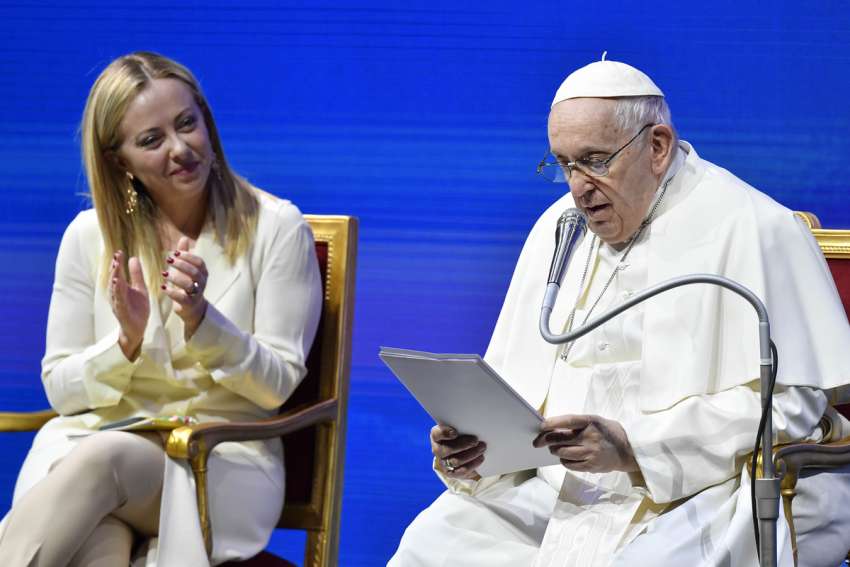ROME -- Starting a family and having children has become a kind of herculean task when instead it should be valued and supported by everyone, Pope Francis said at a meeting in Rome on Italy's severe decline in population growth.
Today's culture "is unfriendly, if not hostile, to the family, centered as it is on the needs of the individual, where individual rights are continually claimed and the rights of the family are not discussed," the pope said at the meeting May 12.
Women face "almost insurmountable constraints," he said, especially as they are often forced to choose between having a career and being a mother or caring for family members who are frail or need special care.
"Women are slaves to this norm of selective employment, which also hinders them from motherhood," he said.
The conference is an annual event that focuses on the general state of Italy's birthrate and demographics and seeks to bring all sectors of society together to pursue concrete ways to reverse the country's declining birthrate. Sponsored by the Foundation for Natality and the Italian Forum of Family Associations, the conference was being held May 11-12 at a Rome auditorium not far from St. Peter's Square.
According to the Italian National Institute of Statistics, Italy registered a -3% population growth rate last year, and it reached a historic low birthrate with less than 7 births per 1,000 people for a total of 393,000 births in 2022. There were more than 12 deaths per 1,000 people for a total of 713,000 deaths in 2022. Italy's fertility rate of 1.24 was only slightly higher than that of Malta (1.13) and Spain (1.19) last year.
Italian Prime Minister Giorgia Meloni, who joined Pope Francis for the second day of the conference May 12, said today it seems like "a revolutionary act" to talk about the birthrate, motherhood and the family.
It is time to have a country in which "being a father isn't uncool, but is a socially recognized value, in which the beauty of being parents is discovered once again, that it is a truly beautiful thing that takes nothing away and gives you so much," she said.
In his talk, Pope Francis said that bringing children into the world is often seen as a task the family should be dealing with on its own.
"This, unfortunately, influences the mentality of the younger generations, who grow up in uncertainty, if not disillusionment and fear," he said. "They experience a social climate in which starting a family has turned into a titanic effort, instead of being a shared value that everyone recognizes and supports."
"Feeling alone and forced to rely solely on one's own strength is dangerous: it means slowly eroding living as a community and resigning oneself to a lonely existence in which everyone has to go it alone," he said.
The consequence of that, he said, is "only the wealthiest can afford, thanks to their resources, greater freedom in choosing how to shape their lives. And this is unfair, as well as humiliating."
Pope Francis highlighted the many challenges people in Italy face, such as "finding a stable job, difficulty in keeping one, prohibitively expensive houses, skyrocketing rents and insufficient wages."
These are problems that must be dealt with through public policies, he said, "because it is there for everyone to see that the free market, without much-needed correctives, becomes savage and produces increasingly serious situations and inequalities."
"A change in mentality is needed; the family is not part of the problem, but part of its solution," the pope said.
"We cannot accept that our society stops being generative and degenerates into sadness," he said. "We cannot passively accept the fact that so many young people struggle to realize their dream about a family and are forced to lower the bar" of what they really wish for.
It's important that things like making money, concentrating on a career, traveling and valuing one's free time do not become "mediocre substitutes" or selfish aspirations, he said, but are "part of a larger generative project that foster life all around you and after you."
Increasing the birthrate, he said, "means repairing the forms of social exclusion that are hurting young people and their future. And it is a service to everyone: children are not personal assets, they are people who contribute to everyone's growth, creating human and generational wealth."


